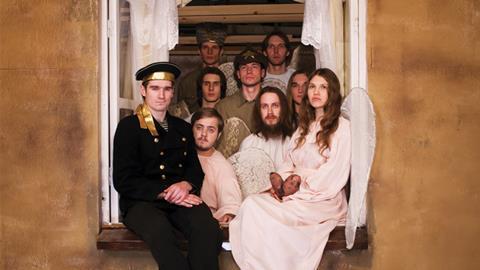Dir: Aleksandr Fedorchenko. Russia. 2014. 112mins

Many would place Aleksandro Fedorchenko’s strange, lyrical 2010 road movie Silent Souls somewhere on the outer edge of the auteur spectrum. But it looks downright commercial compared to the three features he’s completed since then. The latest, Angels Of The Revolution, premiered at the Rome Film Festival, where Fedorchenko also received an honorary Marc’Aurelio of the Future award.
There’s no faulting the inventiveness of Fedorchenko, his co-scriptwriters, and the creative team.
Bursting with ideas and influences, it’s a dense, rambling, often baffling period piece set in the 1930s. Loosely inspired by the so-called Kazym rebellion of 1933, it follows a group of young Soviet avant-garde artists and ethnographers who attempt to spread the modernising, secular Bolshevik gospel in a remote Siberian province whose proudly independent inhabitants are still tied to their folk traditions, and to the old pre-Christian gods.
Fedorchenko’s facts are never to be taken at face value: this is, after all, the director of First On The Moon, a mockumentary about how the Soviets actually beat the Americans in the race to put a man on the moon. Silent Souls and his 2012 outing Celestial Wives Of The Meadow Mari both dealt with the folk traditions of minority ethnic groups inside Russia in a magical realist style, embroidering the ethnographic data to generate an intensely original, personal vision. Angels Of The Revolution takes the same approach, but this time the embroidery extends from the beliefs and traditions of the Khanty people of Western Siberia to the history of avant-garde art in Soviet Russia in the 1920s and 1930s.
Theremin music, Constructivist animation, Sergej Eisenstein’s ill-fated Mexico project, Suprematist painting and the Bolshevik espousal of cremation rather than burial – all this and more are thrown into the mix in a film that luxuriates self-indulgently and sometimes confusingly in digression. Another distraction is the rather stiff and mannered acting style. This may be in the spirit of the times – leading avant-garde theatre director Meyerhold was a proponent of just such a stylised, gestural approach – but the effect is often alienating. Unlikely to score many more sales deals than the zero or so notched up by Celestial Wives, Angels looks likely to follow that film’s path of further festival action and occasional film society screenings.
In the first hour or so, we’re introduced to gun-toting adventuress, Soviet revolutionary leader and tribal expert Polina Schneider (Yekamasova), and the five male companions who will travel with her to bring peace and culture to the Kanthy and Nenet tribes that live in the area known as Yurga around Lake Numto: a musician, a sculptor, a theatre director, a Constructivist architect and a filmmaker. In the Kazym cultural base where they work, there’s also a hospital and a school; but the locals prefer their shamans and herbal remedies, and resist even the avant-gardists attempts to conciliate by presenting folk traditions in innovative ways.
This, though, is to overstate the coherence of a story that is often wilfully abstruse, and which mostly chooses static tableaux and staged confrontation over dramatic realism. There’s no faulting the inventiveness of Fedorchenko, his co-scriptwriters, and the creative team. As in Celestial Wives, the costumes and sets are often dazzling, and cinemtographer Berkeshy conveys some of the excitement and experimentation of these heady early Soviet years – most memorably, in a sequence where a visit of the six friends to a sacred island is projected onto the smoke rising from the bonfire. But the final impression is of an unclassifiable curio, fascinating and frustrating in equal measure.
Production companies: 29th February Film Company, Red Arrow Film Company
International sales: Antipode, elena@antipode-sales.biz
Producers: Dmitry Vorobyev, Alexey Fedorchenko, Leonid Lebedev
Screenplay: Alexey Fedorchenko, with the participation of Denis Osokin and Oleg Loevsky
Cinematography: Shandor Berkeshy
Editor: Roman Vazhenin
Production designers: Alexey Fedorchenko, Artem Khabibulin
Music: Andrei Karasev
Main cast: Darya Yekamasova, Pavel Basov, Georgy Iobadze, Konstantin Balakriev, Oleg Yagodin, Alexey Solonchyov















![[L-R]: Amanda Villavieja, Laia Casanovas, Yasmina Praderas](https://d1nslcd7m2225b.cloudfront.net/Pictures/274x183/6/4/1/1471641_pxl_20251224_103354743_618426_crop.jpg)





